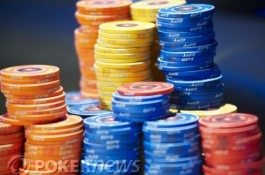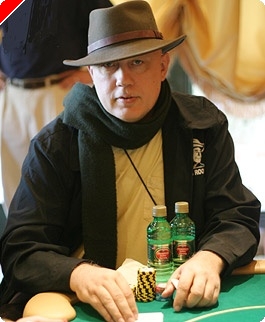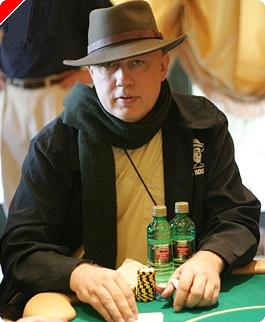Inside the Tour, Volume six

On March 23, 2005 there was a Winning of the Green no-limit holdem event at the Bicycle Club in Los Angeles, California where I witnessed the following hand with many replays and no clear answers. At the first level (15 big blind) player A made it 45 to go from midfield, the cutoff was a beginner who threw out a 500 dollar chip from a stack of mixed chips, clearly intending to raise, after some argument he was correctly ruled to have only called as the 'one chip' rule was in effect and the button, and then the big blind, who was the table leader in chips also called. The flop was 8h7h3h and the big blind now bet out 160 into a pot of 185, player A called and the beginner called, with the button passing. The turn was the ace of diamonds and the big blind now bet 425 into the pot of 665 with player A calling, now the beginner began to rock back and forth, shuffling his chips around, and finally uttered "all-in" and raised his last 870 into the pot, this was enough to almost put player A all-in as well and both he and the big blind called. It came 10 of hearts on the river, player A's last dab of chips went in and the hands came face up. Kh5h for the big blind, AcAs for the beginner, and AhQc for player A, who now raked in an enormous pot of well over 4,000. The beginner goes broke with top set, the big blind flopped the second best possible hand and got hurt, and the AhQc got an enormous gift. Now the guessing began. If the beginner had raised to 500, as he intended, would he have won the pot? Most players thought so but I had played for hours with him in his first no-limit event a few days before and had seen him make this play over and over with A-10 off-suit and I might have called with the AQ... no one knows for sure, of course.
I won the March 22, 2005 pot limit holdem event at the Winning of the Green, which is not a surprise to those that know me as I persistently mention that pot limit at any poker game is far and away the most skillful form of that game. In limit holdem beginners can do quite well, as drawing hands have life and ignorance is bliss, no-limit holdem has become a testosterone driven guessing game of big bets before the flop (I am not belittling its moniker as the Cadillac of poker games, the title is well earned.), and only pot limit challenges you to think about the actual consequence of every action. The very reason that it is the most skillful format is the reason it will never be popular (I was the pot limit holdem player of the year in the Cardplayer format in 2002, and am a perennial contender in that category and so offer this view as an authority, but not in an unprejuidiced manner. If you look at the final 18 players of most pot limit holdem events you will often see 15 or more good players leftcompare that with your final 18 in a no-limit holdem event!). The reason pot limit will never be as popular as no-limit is not only that it does not make as good a product for television, but because it is harder math-wise for the dealers, for the players, for the house, and the pots are not as big (it is played without antes pressing upon your stack, forcing you to gamble more often than you might wish to) which does not translate into as many dramatic moments. I have often called pot-limit 'no-limit with brakes on', this is because it takes three actions to arrive where players can go instantly in no-limit. For some players this is boring. In no-limit every time the action comes to them the player only needs to know how to utter the magic words "all-in!".
I will illustrate the thinking involved in pot limit by talking about the following hand; I held KhJh and made it 325 to go from a decent stack [4400], the big blind was 150 and had been put in by chip leader Chris Karagulleyan with 9500, par was about 2600 at this time so Chris had an average stack for the final table already. A conservative player on the button called (leaving himself about 2200) and Chris called. The flop came A63, with two small hearts.
Parenthetically I must mention here that if you are a beginner I would recommend not even playing this hand K♥J♥, if you are an intermediate player you might limp with it, but raising is much more risky because you will likely have to make some tough decisions with it later on, starting with what to do when you get re-raised before the flop by any of the five players to act after youand that would be an article all by itself.
Chris checked and I checked and the button bet 450 into a pot of 1050. Chris called (he asked me at the next break what I would have done if he had raised. My answer is the truthI do not know! I might muck it (amazing to a limit player, but in big bet you are often looking at only one pull to make the hand, not the same as when you have two cards to come to complete your hand), and I might re-raise with it. If I re-raise I am committing to the hand. I might win the hand without any cards coming off, and I might win the hand by making the flush... but it is very tricky because I do not have the value that I would like to have. The value that I would hope to have to make this play is to also have a gutshot straight draw, a pair, or a nut flush draw with an overcard, or two overcards and the flush draw. I have none of these possibilities so I would lean to the fold because Chris has so many chips. On the other hand we are still at 30 players and they are only paying 9 spots and all the real money is in the top three spots. So if we put all that in the biocomputer I still do not know what action I would have taken. As I am fond of saying, 'you have to be there!' I called the 450 bet and off came the Ace of hearts. What an interesting card! Now I hold the nut flush but the board is paired. Chris checked and I bet the maximum [2400], expecting to be at least called by the button or by Chris, and possibly checkraised. I am committing all my chips to this hand right now while it has a good chance of being the best hand. If either opponent has an ace he has to at call, make a tough laydown, or raise me all-in! Checking here would be a blunder. In some cases you stay alive to fight another day but you are passing on an admittedly risky effort to get a bunch more chips, and without accumulating a large pile of chips you will almost never win a tournament. You might get to the bottom of the payout scale by playing tight, but you will almost never win, and your hourly expectancy will be a minus.
Back to the hand. The button passed rather quickly and Chris went into the tank. He counted out the call, he counted out the play of raising me all-in. Now all this while I believe he has an ace, and as time goes on I am giving him quite a weak kicker, possibly a five, and he is unhappy with letting himself get into this predicament, not knowing what to do, and knowing that if he plays the hand he just as well set me all-in as he has to call the river also. At last he raises me all-in, I call, and he turns up the 9h8h for a smaller flush, drawing dead, and I become the chip leader in the tournament.
Later a player came to my table and won three large pots to pass me for the chip lead, he was sitting to my immediate left when the following hand occurred. The big blind was now 300 and I made it my typical two and one half times raise [to 750 in this case] with AcAs, only the chip leader called and the flop came J98 with two hearts, I bet 1600, not really in love with the flop, and not knowing what action I would take if raised. He thought for a bit and raised 5000. So he is offering to put my last 6800 into the pot [which is now 10,000]. Or I can pass and still have well above average. The conservative player would just quietly muck the hand, thinking that it was an unfortunate situation, but that it was unlikely to be the last pair he held that day, and was certainly not the last time he would lose with aces. I thought long and hard in this spot as I am going to have to play for my tournament life if I play this hand. If I win the hand I will be a huge chip leader for the event with about 19,000 with the cost per round of only 450 and second place holding only about 8,000. I did not think my opponent held Q-10 or 10-7 but there were still many made hands to worry about as all three cards were in the hitting zone and a set was certainly possible. After going through the possibilities I decided that the most likely holding was AhKh, w Kh10h, or Jh,10h, as close runners up. It was hard to imagine that he would risk 85% of his stack with a straight draw, but even that was possible. I would not have been stunned if he held Js10s or some similar hand, like As10s. In all scenarios if he held a drawing hand it was worth the risk to call, and I did so. He then turned up AhQh for a twelve out hand and when it came blank blank I held the chip lead for the rest of the event.
Your tournament life is often like this, when they miss their draws you are a genius!
So play good and get lucky!
Please visit our online poker room directory to see the best bonuses on the web!








